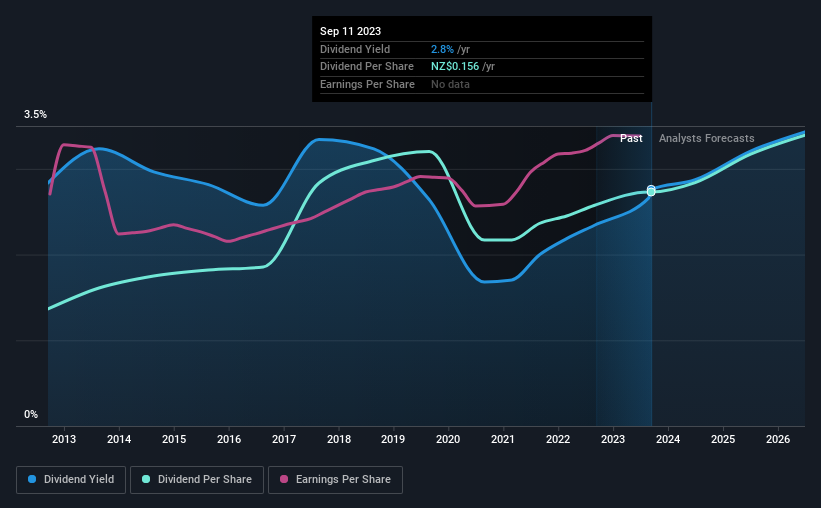- New Zealand
- /
- Infrastructure
- /
- NZSE:POT
Port of Tauranga (NZSE:POT) Has Announced That It Will Be Increasing Its Dividend To NZ$0.1035
Port of Tauranga Limited (NZSE:POT) will increase its dividend from last year's comparable payment on the 6th of October to NZ$0.1035. This makes the dividend yield 2.8%, which is above the industry average.
View our latest analysis for Port of Tauranga
Port of Tauranga's Dividend Is Well Covered By Earnings
A big dividend yield for a few years doesn't mean much if it can't be sustained. Before making this announcement, Port of Tauranga was paying out quite a large proportion of both earnings and cash flow, with the dividend being 110% of cash flows. Paying out such a high proportion of cash flows certainly exposes the company to cutting the dividend if cash flows were to reduce.
Over the next year, EPS is forecast to expand by 24.0%. If recent patterns in the dividend continues, the payout ratio in 12 months could be 90% which is a bit high but can definitely be sustainable.

Dividend Volatility
The company's dividend history has been marked by instability, with at least one cut in the last 10 years. The dividend has gone from an annual total of NZ$0.078 in 2013 to the most recent total annual payment of NZ$0.156. This means that it has been growing its distributions at 7.2% per annum over that time. We have seen cuts in the past, so while the growth looks promising we would be a little bit cautious about its track record.
The Dividend's Growth Prospects Are Limited
Growing earnings per share could be a mitigating factor when considering the past fluctuations in the dividend. Earnings per share has been crawling upwards at 4.2% per year. Slow growth and a high payout ratio could mean that Port of Tauranga has maxed out the amount that it has been able to pay to shareholders. When a company prefers to pay out cash to its shareholders instead of reinvesting it, this can often say a lot about that company's dividend prospects.
The Dividend Could Prove To Be Unreliable
In summary, while it's always good to see the dividend being raised, we don't think Port of Tauranga's payments are rock solid. The track record isn't great, and the payments are a bit high to be considered sustainable. We would be a touch cautious of relying on this stock primarily for the dividend income.
It's important to note that companies having a consistent dividend policy will generate greater investor confidence than those having an erratic one. Meanwhile, despite the importance of dividend payments, they are not the only factors our readers should know when assessing a company. Earnings growth generally bodes well for the future value of company dividend payments. See if the 4 Port of Tauranga analysts we track are forecasting continued growth with our free report on analyst estimates for the company. If you are a dividend investor, you might also want to look at our curated list of high yield dividend stocks.
New: Manage All Your Stock Portfolios in One Place
We've created the ultimate portfolio companion for stock investors, and it's free.
• Connect an unlimited number of Portfolios and see your total in one currency
• Be alerted to new Warning Signs or Risks via email or mobile
• Track the Fair Value of your stocks
Have feedback on this article? Concerned about the content? Get in touch with us directly. Alternatively, email editorial-team (at) simplywallst.com.
This article by Simply Wall St is general in nature. We provide commentary based on historical data and analyst forecasts only using an unbiased methodology and our articles are not intended to be financial advice. It does not constitute a recommendation to buy or sell any stock, and does not take account of your objectives, or your financial situation. We aim to bring you long-term focused analysis driven by fundamental data. Note that our analysis may not factor in the latest price-sensitive company announcements or qualitative material. Simply Wall St has no position in any stocks mentioned.
About NZSE:POT
Port of Tauranga
A port company, provides and manages port services and cargo handling facilities through the Port of Tauranga, MetroPort, and Timaru Container Terminal in New Zealand.
Proven track record with adequate balance sheet.
Market Insights
Community Narratives



